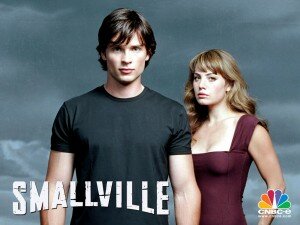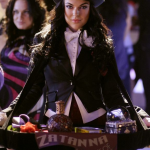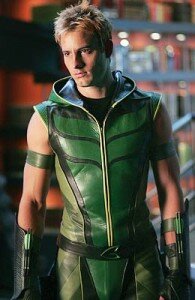
Because I'm not a Smallville fan, I am going to post pictures of the hotties from the show.
As much as I am a Superman fan, I refuse to watch Smallville. My friend Rich confronted me on the issue once.
“Why won’t you watch it?” he asked.
“It’s not really Superman,” I said.
After Superman Returns came to theaters and I embraced the film and ignored all of its flaws, he brought up a really great point. He said, “You’re willing to ignore the problems with the movie, but you get hung up on continuity with Smallville? That doesn’t make any sense.”
And for awhile, I was hard-pressed to defend why I really didn’t like the show when I could easily ignore problems with Superman in other media, but I think I can properly explain it now.
Ultimately, I don’t care about Clark Kent. I mean, he’s an important part of Superman, obviously, but I don’t like a Superman without confidence. The thing that makes Superman great is the depth of his love and hope for humanity. He is infallible in his kindness and caring for others and no matter what, he does the right thing. This savior complex is what makes Superman who he is, but in all fairness, that would be a really boring show with no potential for growth.

*sigh* Erica Durance was perfect as Lois Lane at least . . .
Maybe my problem with Smallville really comes from my distaste for origin stories. The first film in a series of comic book movies is usually the worst in my mind because the film must set up the origin story for the hero, and being a comic book fan, I’ve seen origin stories so many times that I don’t care to see them played out on the screen, but I understand the need for it.
Batman Begins was a loathsome film up until Bruce Wayne goes full Batman because no one really cares about Bruce Wayne or the hero’s journey . . . they only really care about Batman. Bruce Wayne is only cool because he IS Batman. I don’t want to see ten year old Bruce Wayne remember Hallmark moments with his dad. I want to see Batman frighten criminals and swoop down upon them like a monster.
The first X-men film was a decent enough, but I didn’t really want to see the team get together because it doesn’t really matter how they got together – they just need to do cool stuff.

Congrats on your post Smallville career of . . . Street Fighter: the Legend of Chun-Li. Great job.
So, to me, Smallville was a ten year origin story and therefore, I just don’t care.
I know that die hard fans are telling me that I’m wrong right now because it was so much more. Doomsday was on the show, and Darkseid, and Brainiac, and all manner of superheroes that were never in Superman’s original origin story and so the show became a DCU show by the end of it, and for that, I suppose we should praise the show a bit.
I mean, let’s face facts – Smallville is the closest we will ever get to seeing the Legion of Superheroes, Booster Gold, Zatanna, and many other DC heroes in live action. There will be nothing else like this show for a very long time, so while the origin might be eight kinds of screwed up, it was a show that was a gateway for the DC Universe to be on television.
But (and isn’t there always a but?) what did it ultimately accomplish?

Allison Mack. Dual-lighter. There. I said it.
Season 1 premiered with an audience of 8.4 million viewers. Each subsequent season declined from then on with the exception of season 7 which saw a small spike in viewers. The final season premiered with 2.98 million viewers and the final episode had 3.02 million.
Smallville was a runaway hit and the WB probably assumed that it would surely translate to comic sales, but it wasn’t to be. While the show was pulling in millions of viewers, Superman comics wouldn’t rise about 50,000 copies sold at least during the first year of the show being on the air (probably longer than that, but I’m too lazy to look through every single month’s sales for the past ten years to look for too many correlations tonight – if you’d like to, here is the link).

!toh si ehS
Eventually, DC decided to really capitalize on the TV series by making a Smallville comic book (just in case TV viewers were really stupid and couldn’t figure out that the show was about Superman but they still would have liked a comic about the show). Here are some sales highlights:
March 2003
| Smallville | 1 | $3.50 | DC | 28,957 |
July 2003
| 114 | Smallville | 3 | $3.95 | DC | 20,119 |
The last issue was released in January 2005 and didn’t even make the top 300 on Diamond’s Sales chart.
Perhaps if we can learn anything from Smallville, it’s that you can lead comic readers to watch a TV show or a movie about a comic book, but you can’t get TV watchers to read a comic book.
The last episode had 3.02 million viewers which is ten times the highest selling comic book according to Comicchron’s records (which was Fantastic Four vol. 2 #1 with 313,980 copies . . . and I’m sure there are comics that have sold more, but that is as far back as the list goes and no other comic in any other month comes close to touching that one). If even half the people who watched Smallville read a Superman comic, then the industry wouldn’t have to worry any longer.
In short, other media does not translate to comic book sales. It doesn’t matter how many cool guest stars appeared on Smallville, because in the end, viewers never went to comic stores to find the books those characters were in. As much as companies would like to increase comic book sales through television and movies, it just isn’t ever going to happen.
Then again, companies probably don’t care one way or another. The WB doesn’t really want to sell more issues of Superman because if they did, they would promote it more. What the WB wants is money from the ideas that comic books can generate. DC is kept around because writers who aren’t paid very much tell stories that will be adapted into other media and because those writers don’t own the rights to the characters, they won’t see a dime of it.
Dan Jurgens created Booster Gold who was featured on an episode of Smallville. Do you think Jurgens made a ton of money on that character’s appearance? Not at all. He MIGHT have received some small compensation because he created the character, but more than likely, he wasn’t given a dime because he created a character that he doesn’t own. DC owns Booster Gold, not Dan Jurgens even though Jurgens created him.
So, the WB allows for DC to continue to operate because they are able to churn out story ideas every month that may some day be turned into the thread for a cartoon, television show, or movie and the company reaps all of the benefits.
No wonder Robert Kirkman decided to quit working for DC and Marvel to just focus on creator-owned projects.

How did this get on here?!



I lost Smallville somewhere around season 4…yeah, probably has something to do with the 10-year origin thing you mention. Too drawn out and goofy at times.
Glad to know you share the same opinion of Batman Begins as I do.
The Twitch Generation couldn’t wait thru the origin/hero’s journey for all the BatMan stuff to start. No surprise.
I’ve seen it before and seen it better in the Burton version. It wasn’t the length so much as the lame sentimentality instead of rage that came with loss and not being able to cope with pain. It’s not a lack of attention because if it were, then I wouldn’t love Batman: Mask of the Phantasm which is ALL ABOUT HIS ORIGIN and done much better.
Going to the movies use to start with curtains either parting or raising to reveal the silver screen. The lights would go down and the theatre would be pitch black. From behind, you’d hear the whirling of the projector and a cone shaped light would fill the screen with magic. Every moment there after was wonderment.
Now, I watch for how the director opens his/her story and what images they use to guide the audience thru their film. What they choose to tell and show is the entertainment.
But, I’m off topic. Sorry. Smallville…
um… never watched it.
I didn’t really start watching Smallville until the Justice Society episode, which was their best episode.
In the beginning it was, as many will say, way to Dawson’s Creek, and this is coming from a guy who likes Clark Kent more than Superman.
It isnt realy an origin story is it superman was born as superman if anything its clark kent’s origin.
Clark on red kryptonite…Clark on red kryptonite marries a cute teleporting chick that could pop up anywhere anytime. If any time during that series Clark Kent wanted to assure us he has absolutely nothing to hide its when he actually believed life with her woould be bearable.
Opinions vary a lot but one thing I think most agree is “on the whole” is that the Smallville series were not boring. Lots of action and good mucical scores.